
When Chuck Bednarik passed away in March, the many tributes focused on his heroics as a football player. That was understandable since Bednarik was one of the greatest players of all time, an All-America at the University of Pennsylvania and an All-Pro with the Eagles, an ironman who played both ways, center and linebacker, for much of his career.
But Bednarik was a hero before he ever set foot in Franklin Field. He was a decorated veteran of World War II, a waist gunner on a B-24 bomber who survived the bloody fighting in the skies over Europe. He returned home with a chest full of medals and a profound appreciation for just being alive. Bednarik often said his war-time experience carried over into his football career.
"There's no question in my mind you're a changed person," Bednarik said in a 1999 interview. "I was this nice, easy-going kid, growing up in Bethlehem, Pennsylvania. I didn't know what was going on in the world and I didn't care. All of a sudden, I'm in a war and people are dying all around me. You grow up quick."
Bednarik enlisted in the Army when he was 18 years old. The war was raging, most of his friends were signing up so he signed up, too. He applied for the Air Corps which was then a branch of the Army. He was sent to aerial gunnery school, passed the course and was assigned to the Eighth Air Force. "The Mighty Eighth," as it was known, was based in England and flew some of the most dangerous missions of the war.
"You go through combat, you develop a killer instinct," Bednarik said. "You become - what's the term - hard core. Did I take that on the field? Yes, to be honest, it did."
Bednarik, who will be honored by the Eagles at Sunday's home opener against Dallas, is legendary for his toughness. He played 14 seasons, all with the Eagles, and was a Pro Bowl selection eight times. He missed only three games in his career and for many years he played virtually every play. In 1960, when the Eagles won the NFL Championship, he was on the field for 58 minutes of the title game against Green Bay and made the saving tackle of Jim Taylor on the final play. It was an amazing feat especially when you consider he was the oldest player on the field at age 35.
At Bednarik's memorial service, Pro Football Hall of Fame president David Baker brought a smile to the congregation saying he could envision Chuck approaching the gates of heaven dressed in his Hall of Fame gold jacket and the Good Lord turning to St. Peter and saying: "You know, I don't make 'em like that anymore." He was truly one of a kind.
But Bednarik would often say playing football wasn't that tough. It was, after all, just a game. Surviving the war, he said, was tougher. "I was never afraid on a football field," he said. "But I was afraid up there (pointing to the sky)."
It is easy to understand why given the history of the Eighth Air Force. Its 40 heavy bomber groups and 15 fighter groups flew some of the most critical, and costly, missions of World War II. They flew daytime strikes deep into Germany hitting factories and munitions plants. The big lumbering bombers were swarmed by German fighter planes and knocked from the skies by anti-aircraft fire.
Remembering Eagles legend Chuck "Concrete Charlie" Bednarik, one of the best players to ever play in the city of Philadelphia.
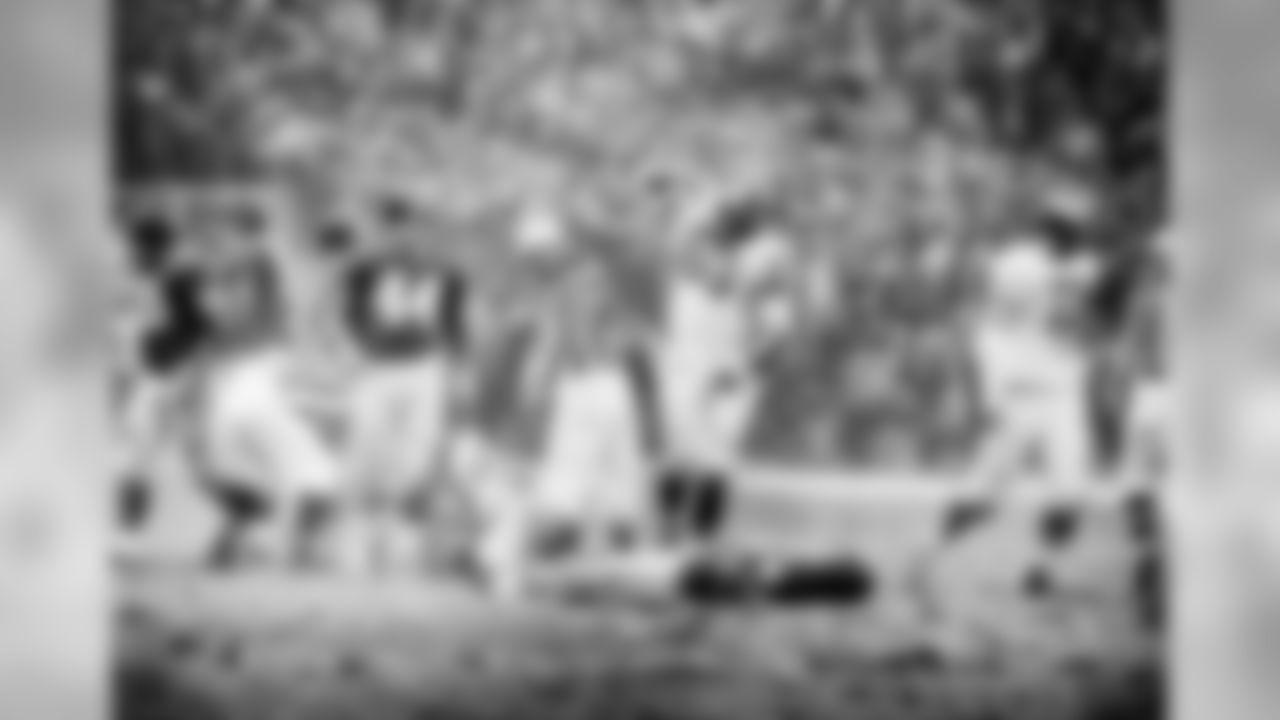
Bednarik will forever be remembered for "The Hit", when he knocked out Giants running back Frank Gifford during a 1960 game
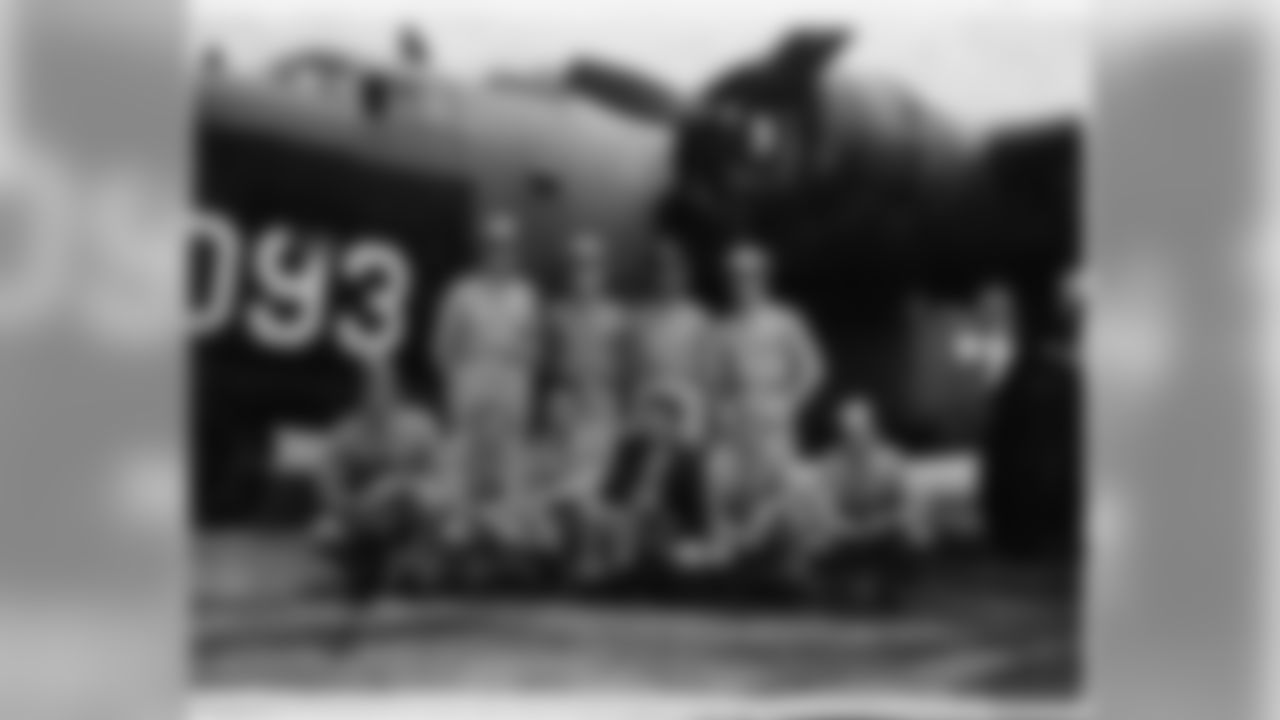
Bednarik served the United States of America during World War II. He was a waist-gunner on a B-24 bomber, earning an Air Medal with five oak leaf clusters and five battle stars
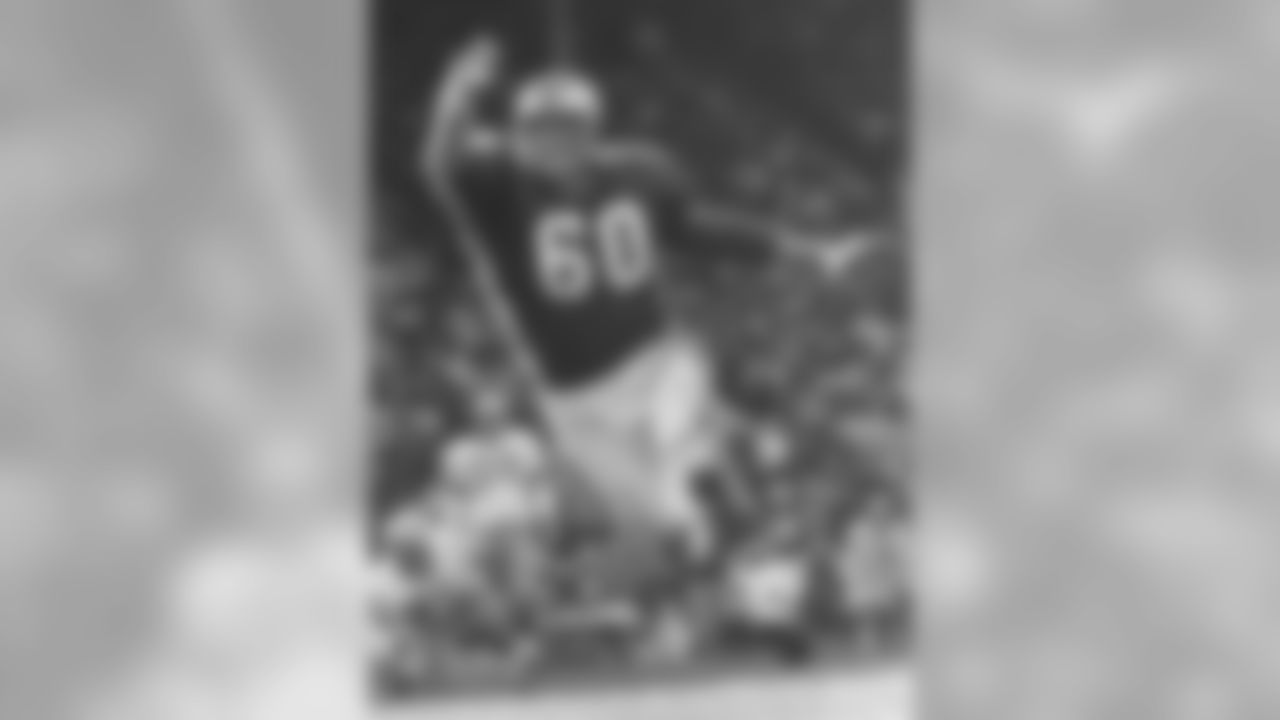
Bednarik played collegiately at the University of Pennsylvania and quickly became one of the best two-way players int he league, dominating at both the linebacker and center positions
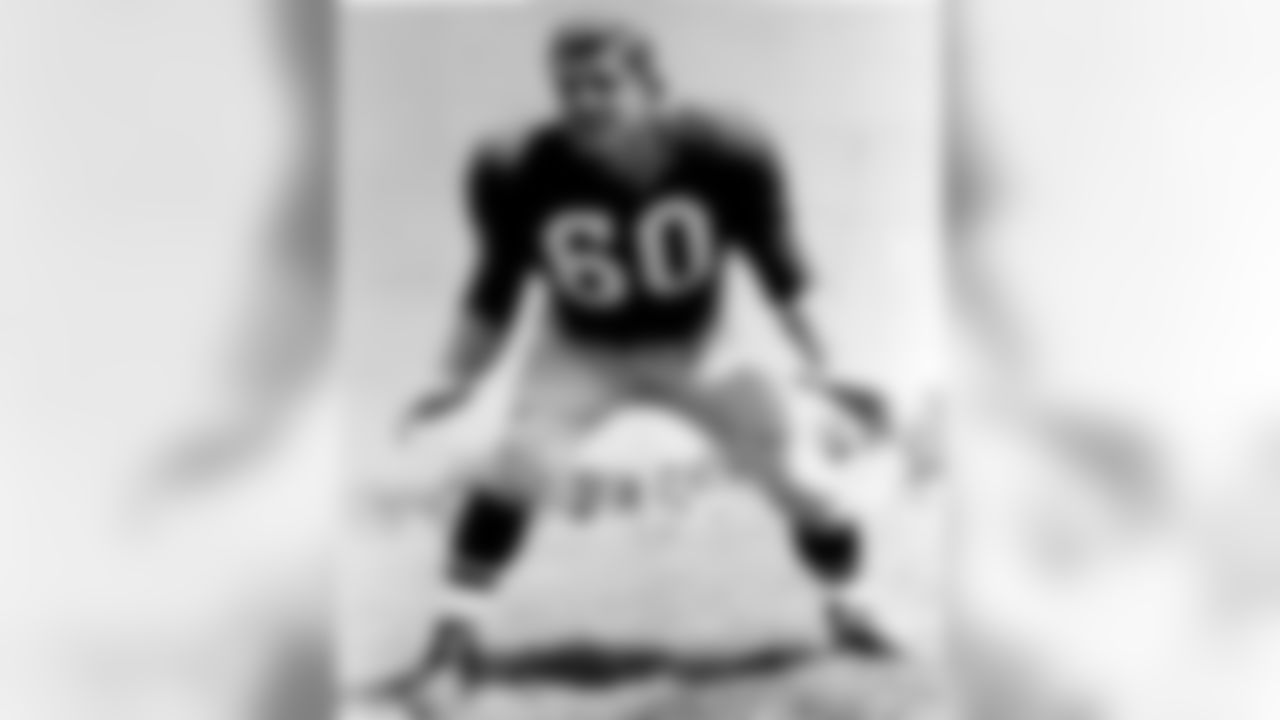
Bednarik's 14 seasons in Philadelphia are the most ever in an Eagles' uniform
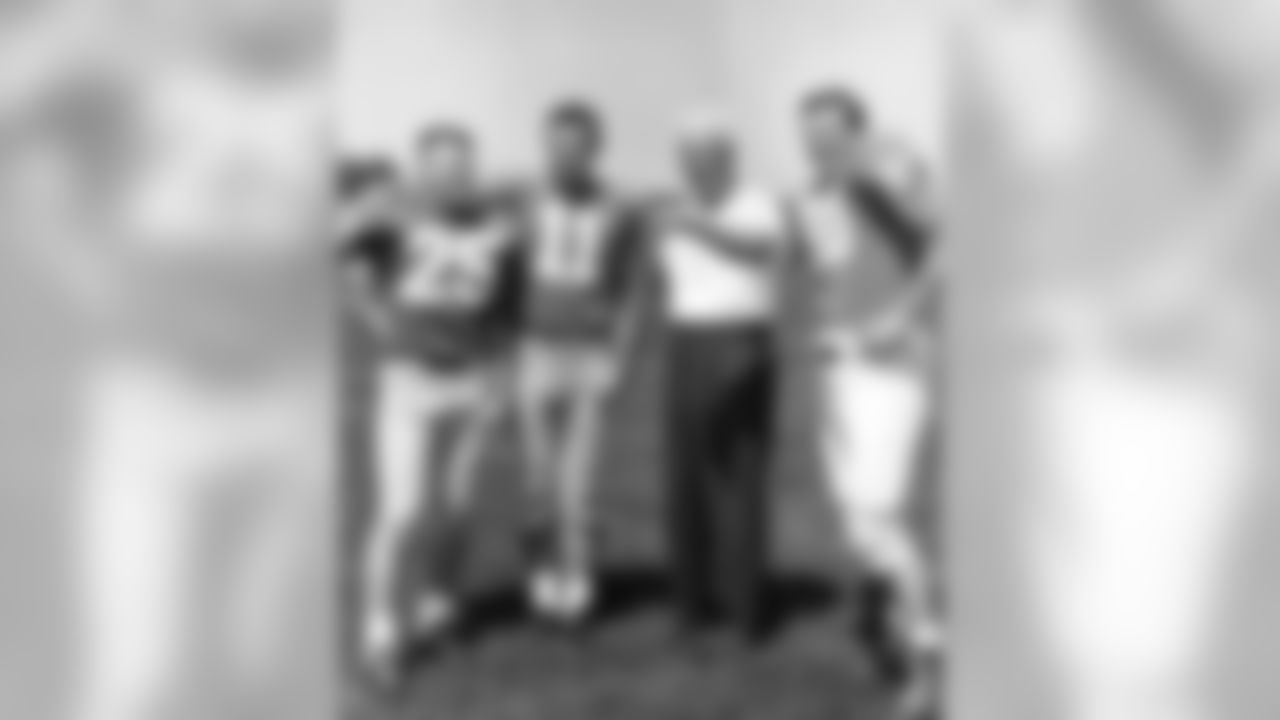
Bednarik helped the Eagles capture two NFL Championships in 1949 and 1960
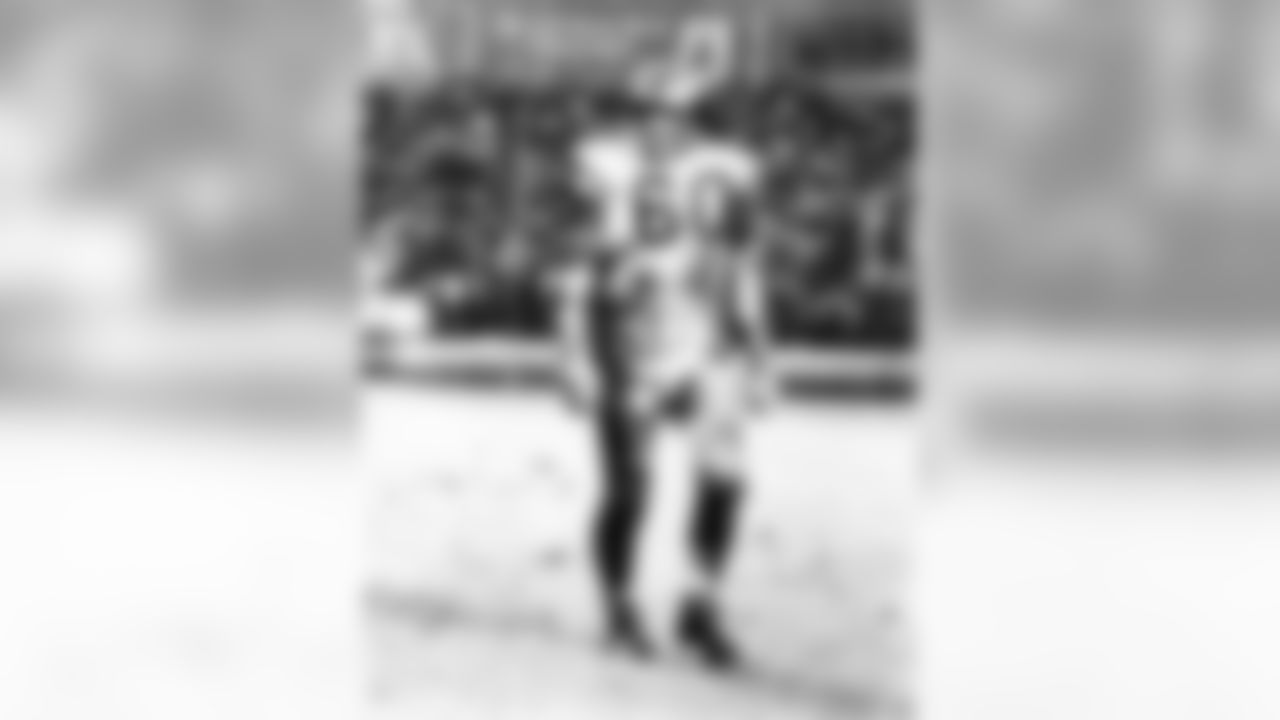
Concrete Charlie's eight Pro Bowl selections are the most in franchise history

A Philadelphia sports legend, Bednarik was beloved by Eagles fans. He returned to Philadelphia during the 2010 season opener to celebrate the 50th anniversary of the Eagles' 1960 Championship team

Bednarik's no-nonsense, physical style of play fit perfectly in the city of Philadelphia, a city that Bednarik called home for his entire life

"He had that aura, Mr. Eagle, the legend come to life." - Bill Bergey on Bednarik
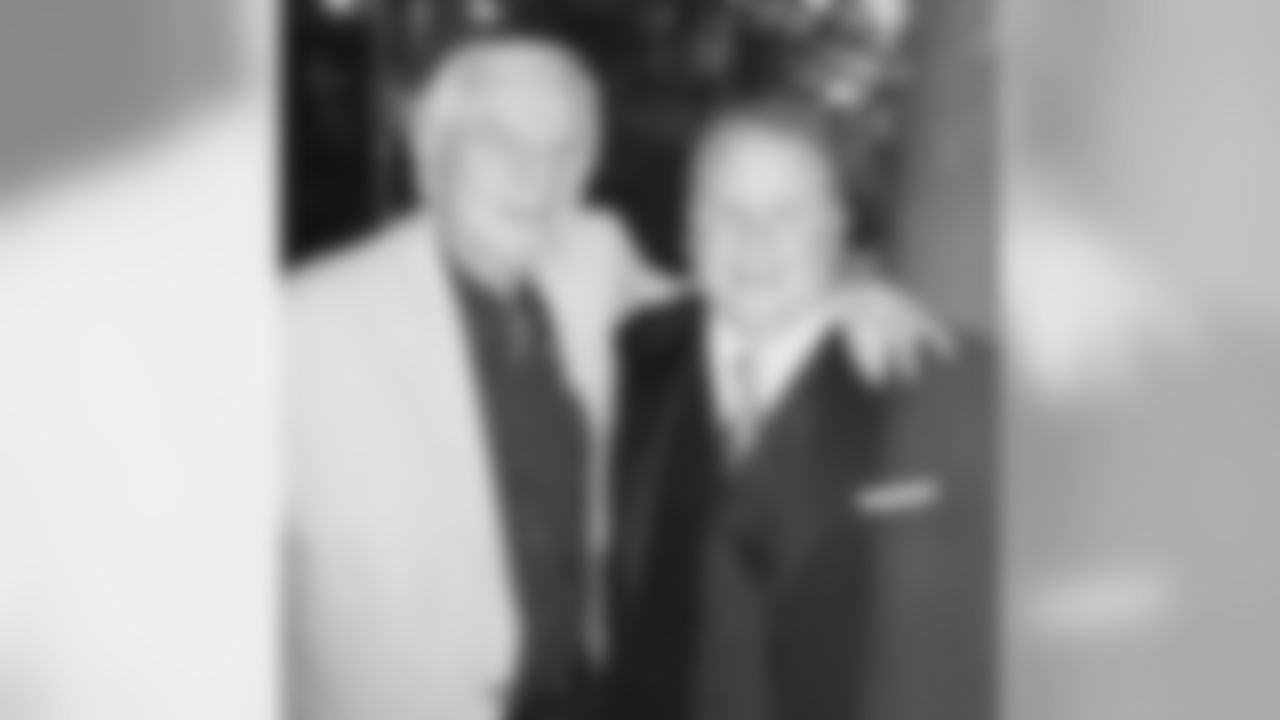
Bednarik and Chip Kelly at the 2013 Maxwell Awards

Bednarik and Kelly during an Eagles' Alumni event

Bednarik alongside Eagles Chairman and CEO Jeffrey Lurie at Eagles Training Camp in 2014

Bednarik says hello to Eagles linebacker Connor Barwin during 2014 Training Camp

Bednarik and his family were in attendance for the Eagles' 2013 home opener against San Diego

Bednarik's No. 60 will never be worn by another Eagle. It hangs in the rafters of Lincoln Financial Field
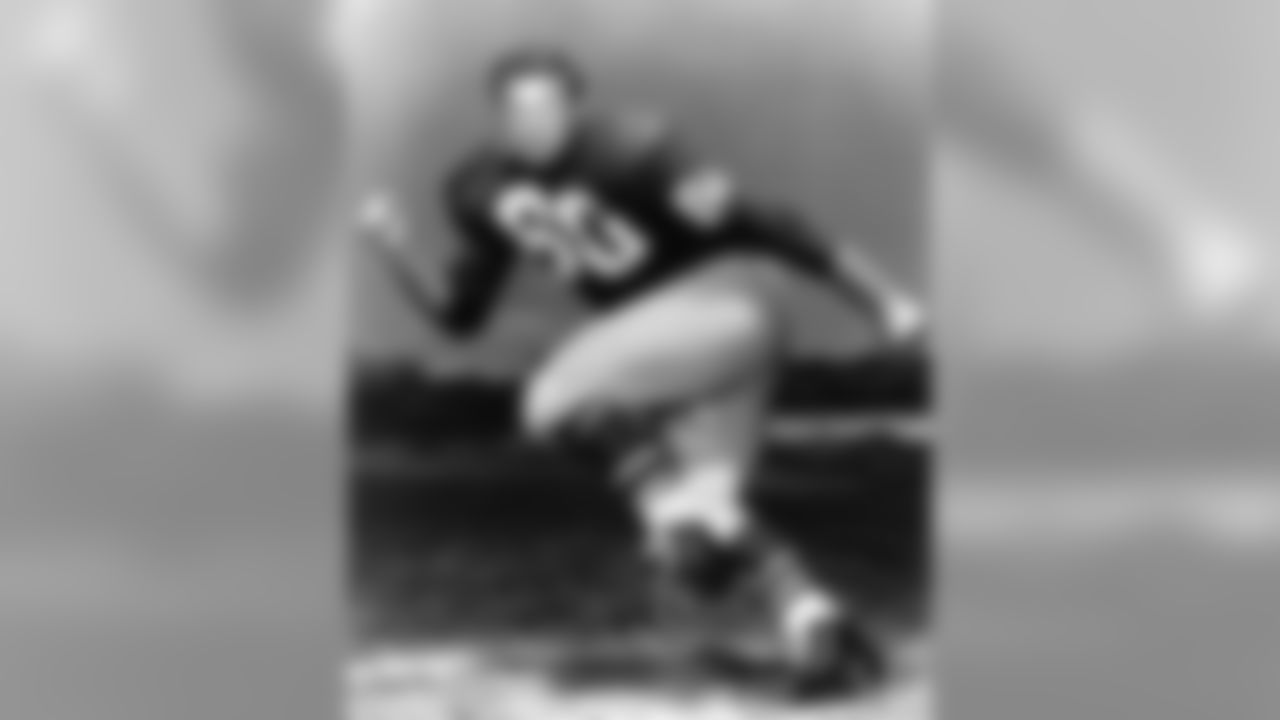
"Chuck wasn't made of the same material as the rest of us, I'm sure of that." - Eagles cornerback Tom Brookshier
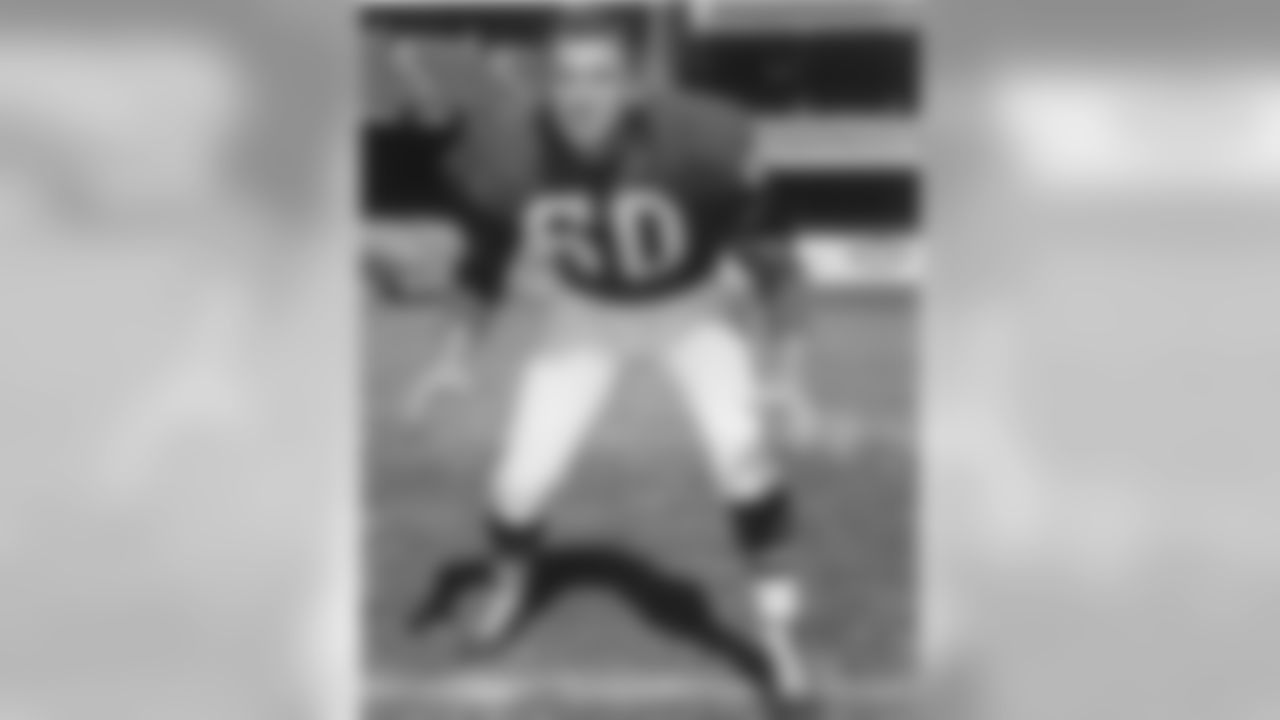
"When I go out there, I want to be the greatest football player who ever lived." - Chucck Bednarik

Chuck and Emma Bednarik with their daughters Charlene, Donna, Pamela, and Carol in 1959
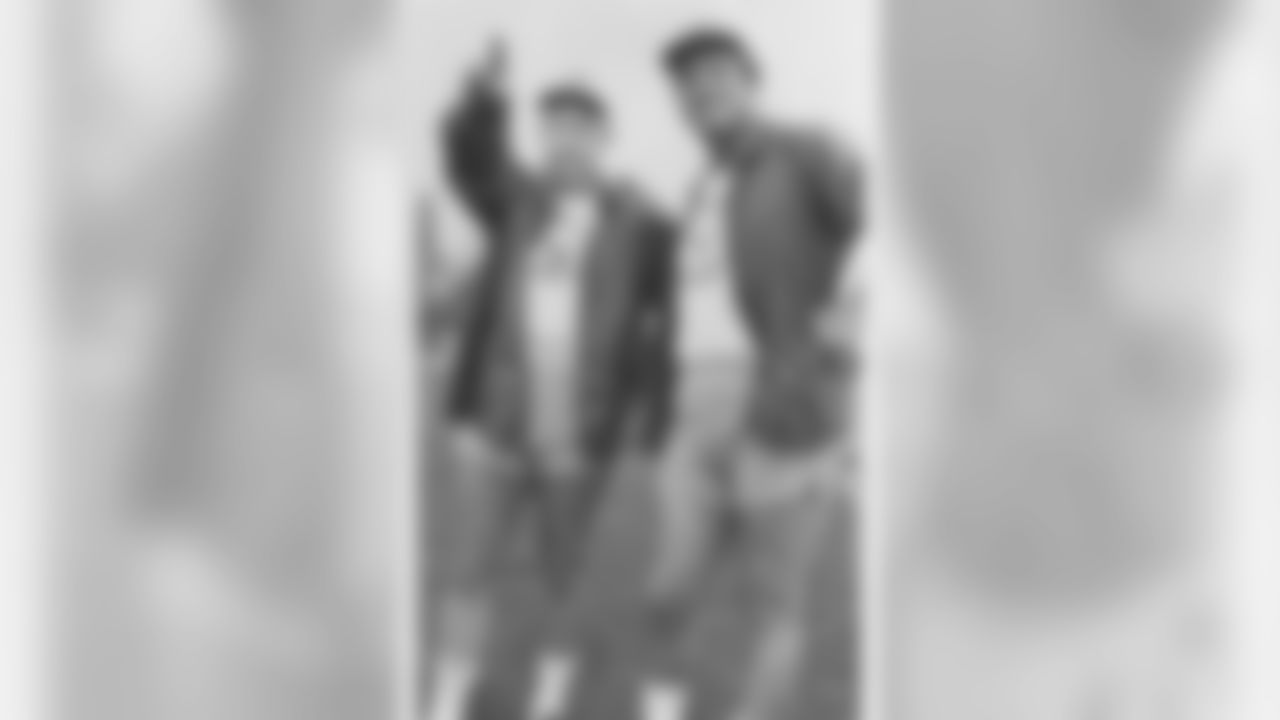
Jerry Williams and Chuck Bednarik in 1969
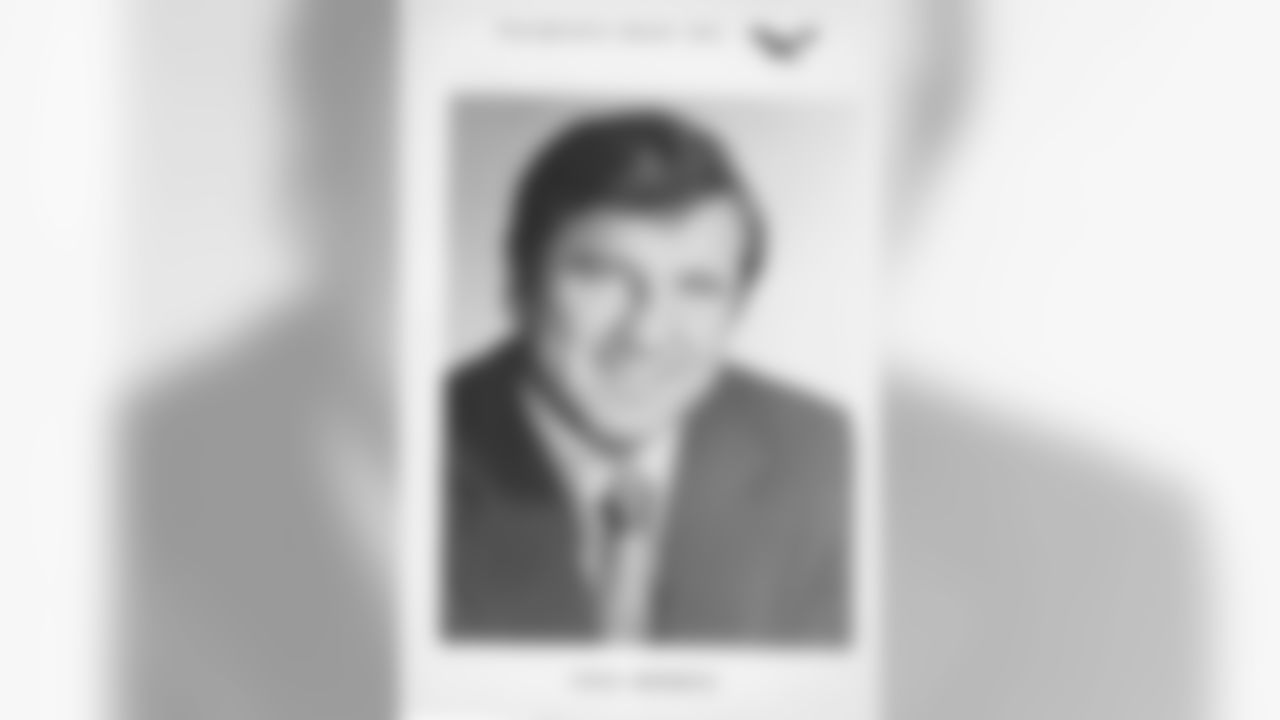
Chuck Bednarik in 1976

The Bednarik family in 1959

Bednarik is announced to the crowd in 1984
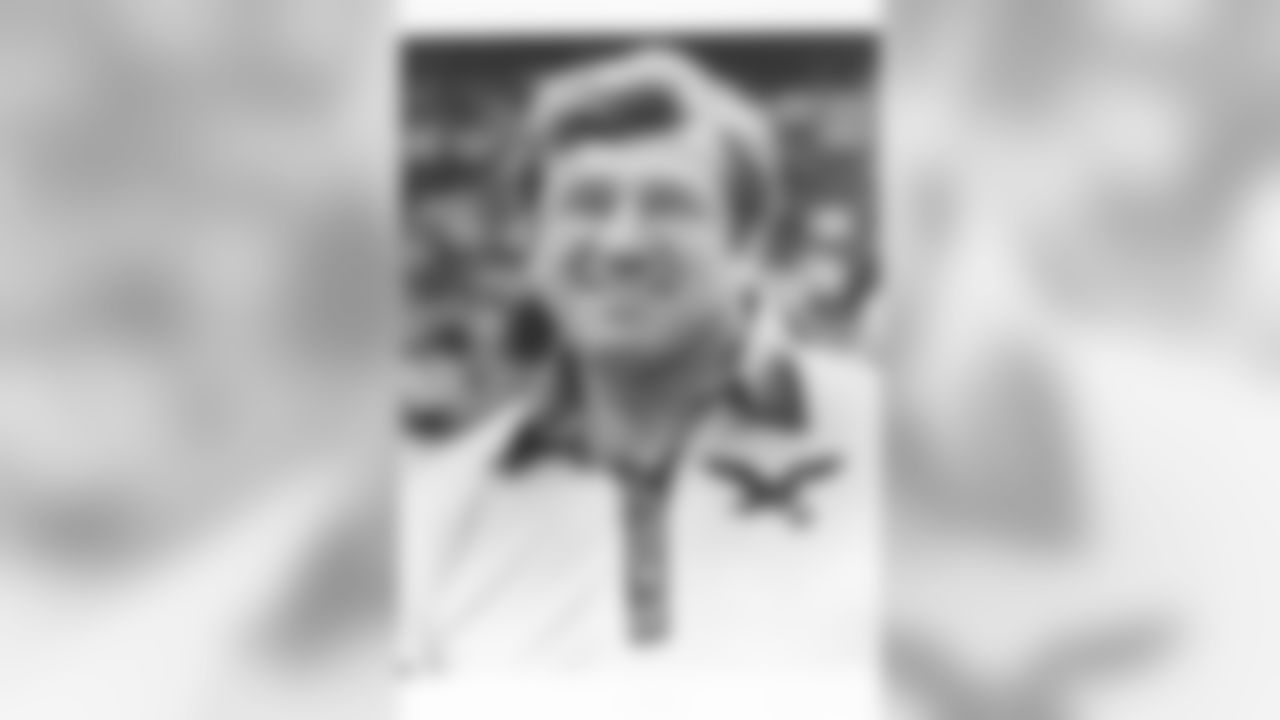
A sideline shot of Bednarik
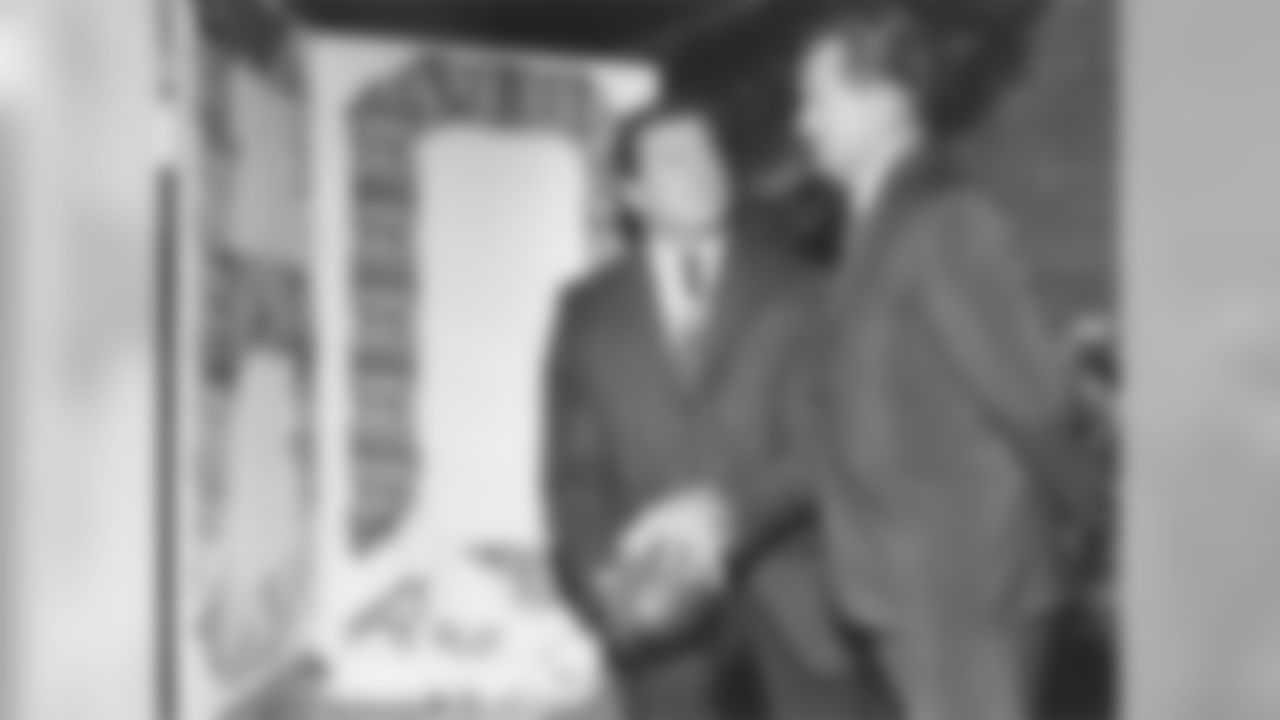
Eagles head coach Joe Kuharick with Chuck Bednarik

Bednarik with Ballantine Brewing Vice President, Carl Badenhausen in 1965
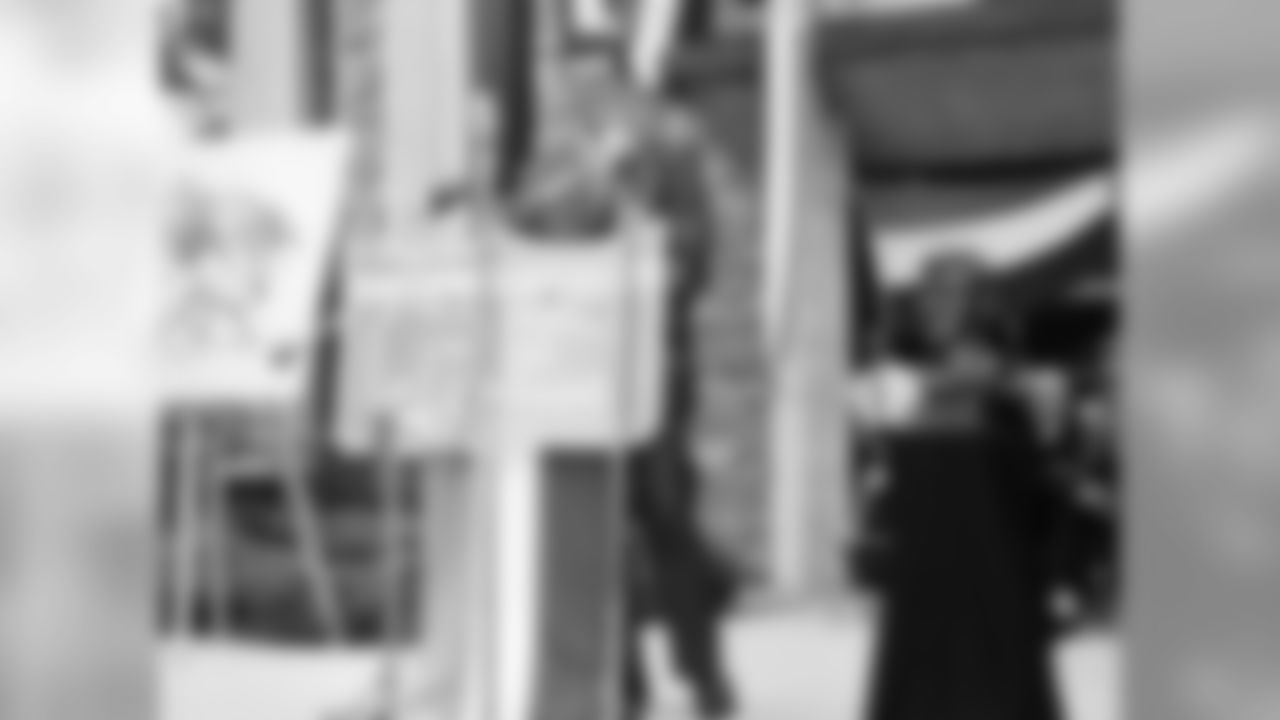
Bednarik giving his Hall Of Fame induction speech
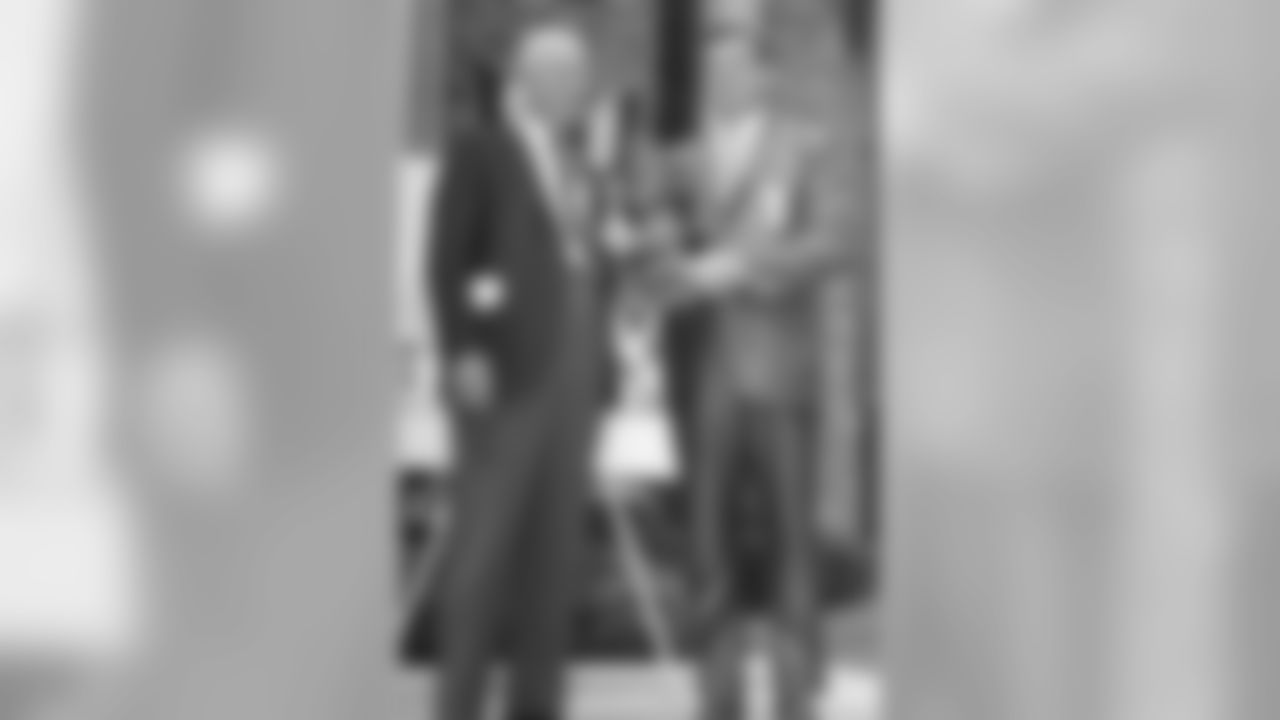
Coach Earle "Greasy" Neale with Bednarik in Canton, Ohio
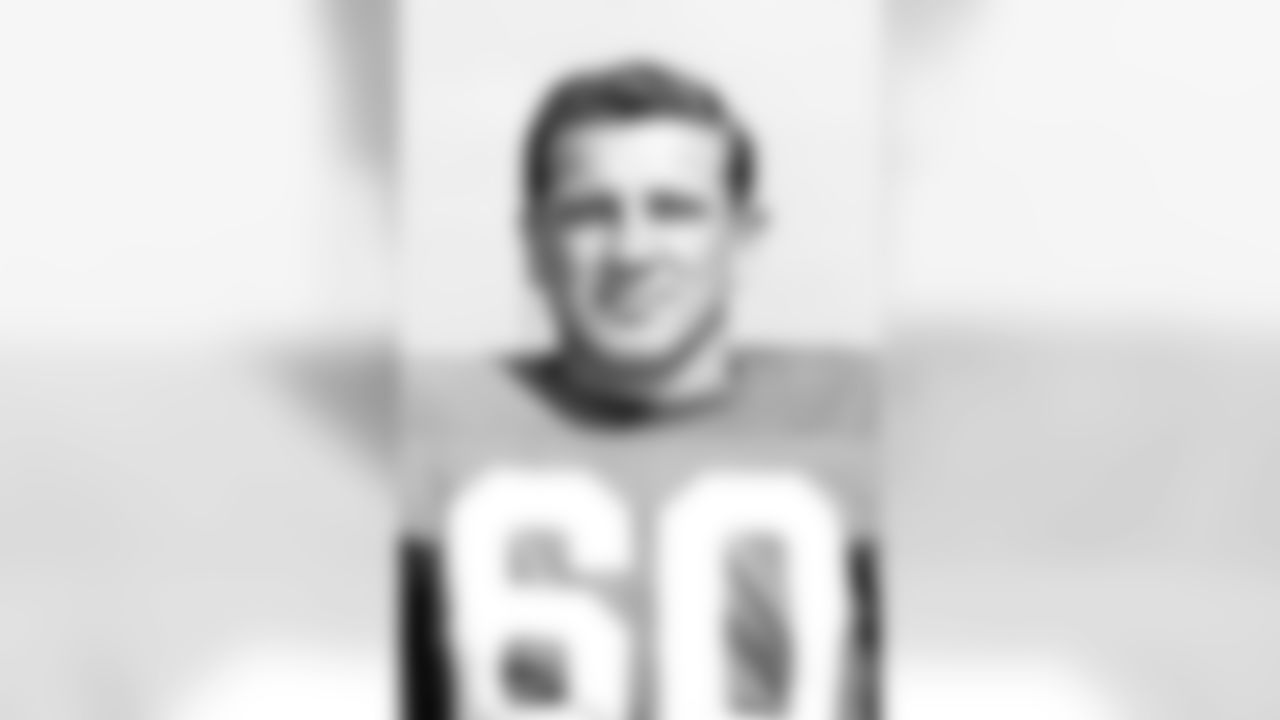
Chuck Bednarik's headshot

Bednarik getting ready to snap the ball for his photo
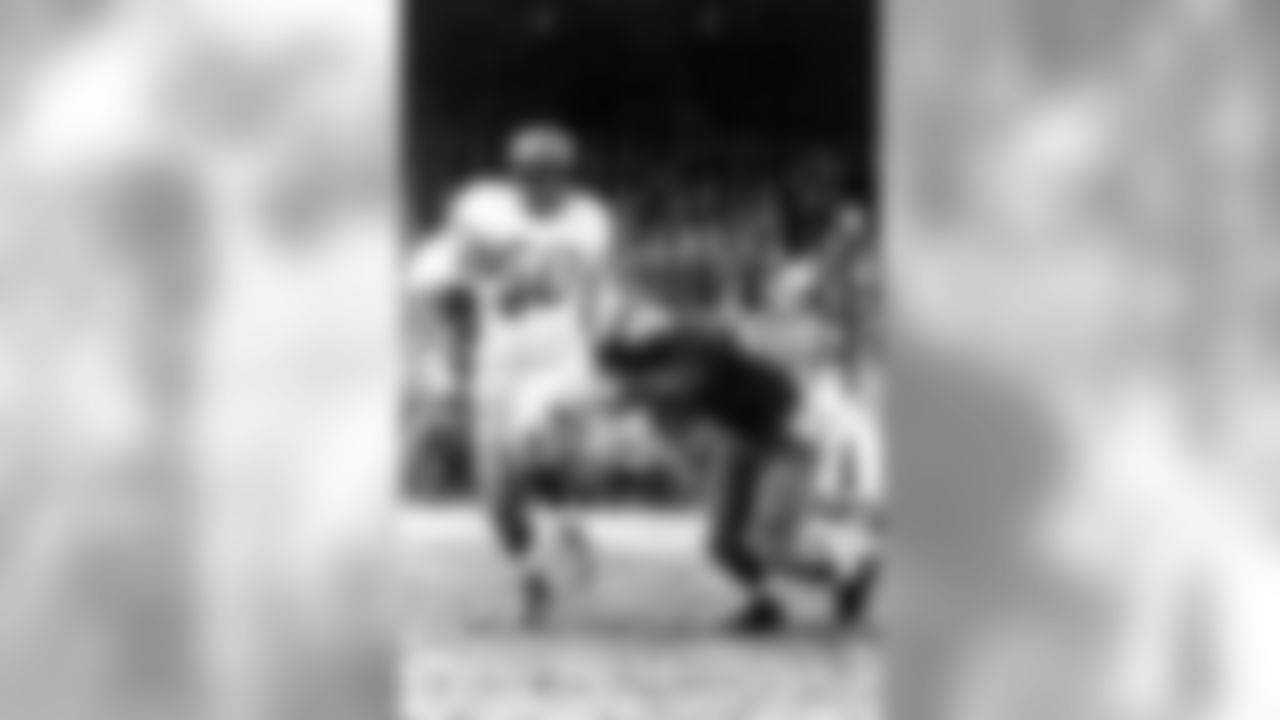
Bednarik making the tackle

Bednarik signing his contract

Bednarik celebrating after a great play
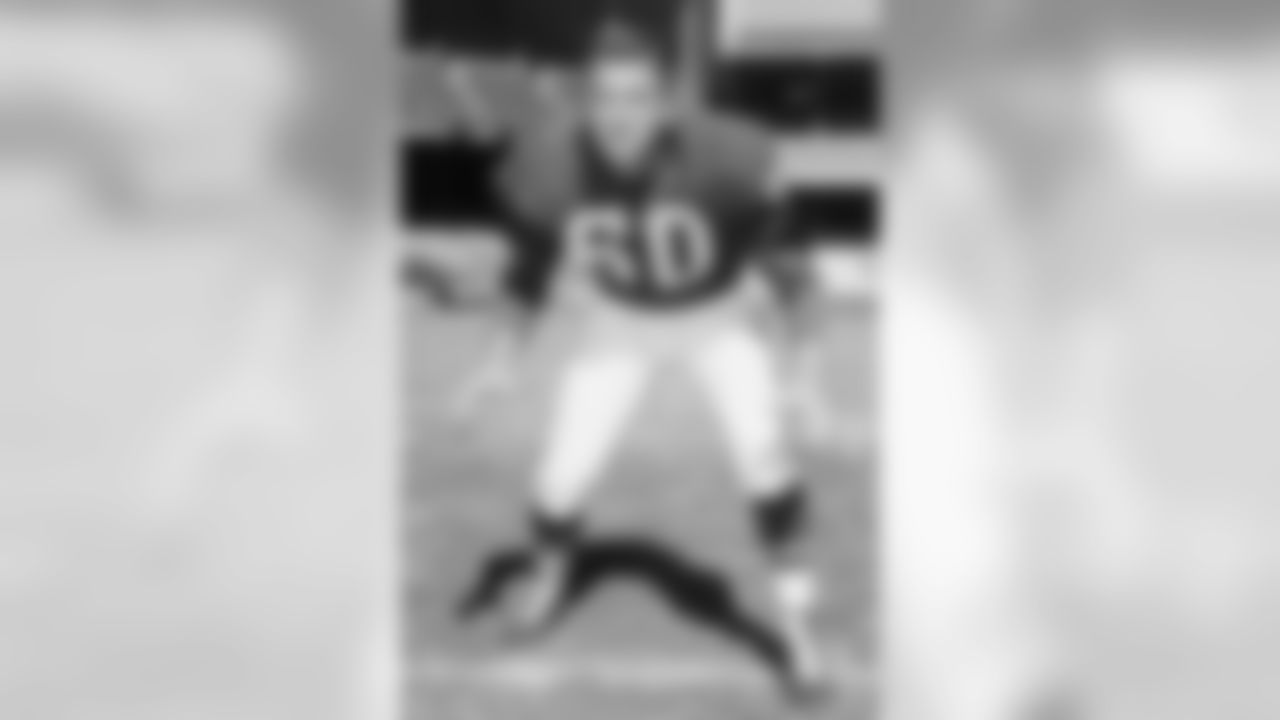
Bednarik getting ready for the season
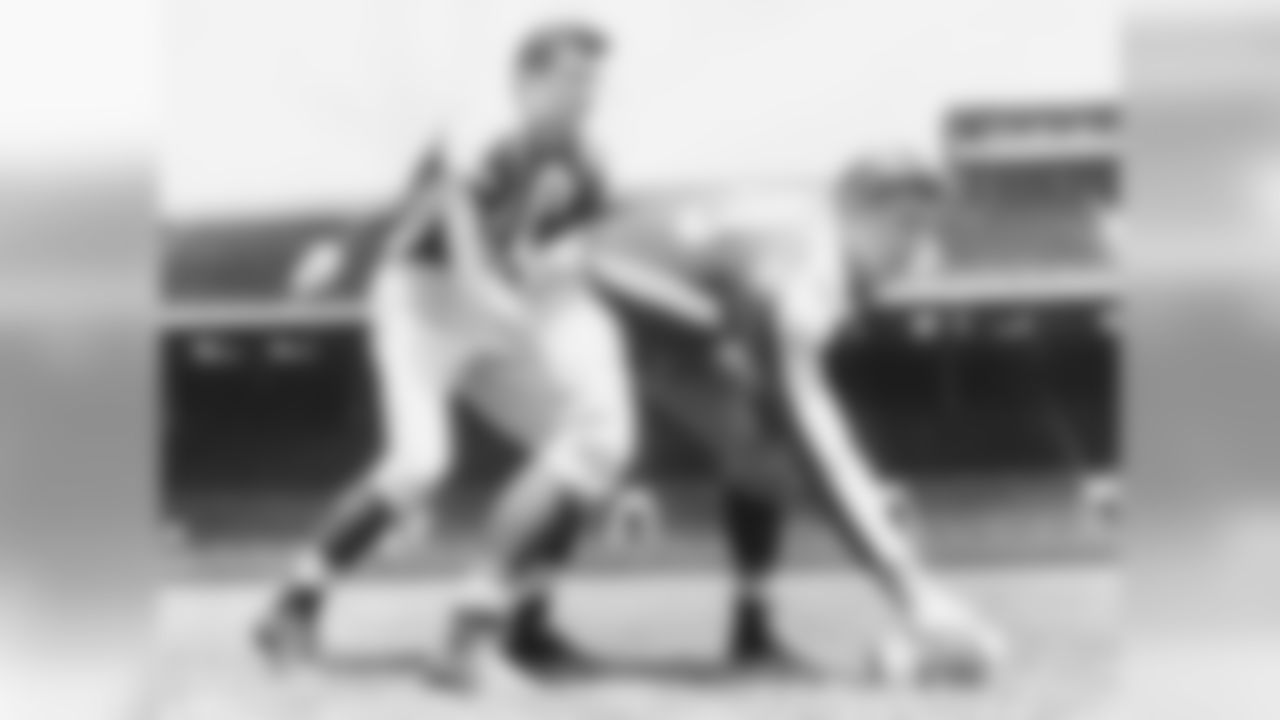
Bednarik working on his snaps

A sideline view of Bednarik
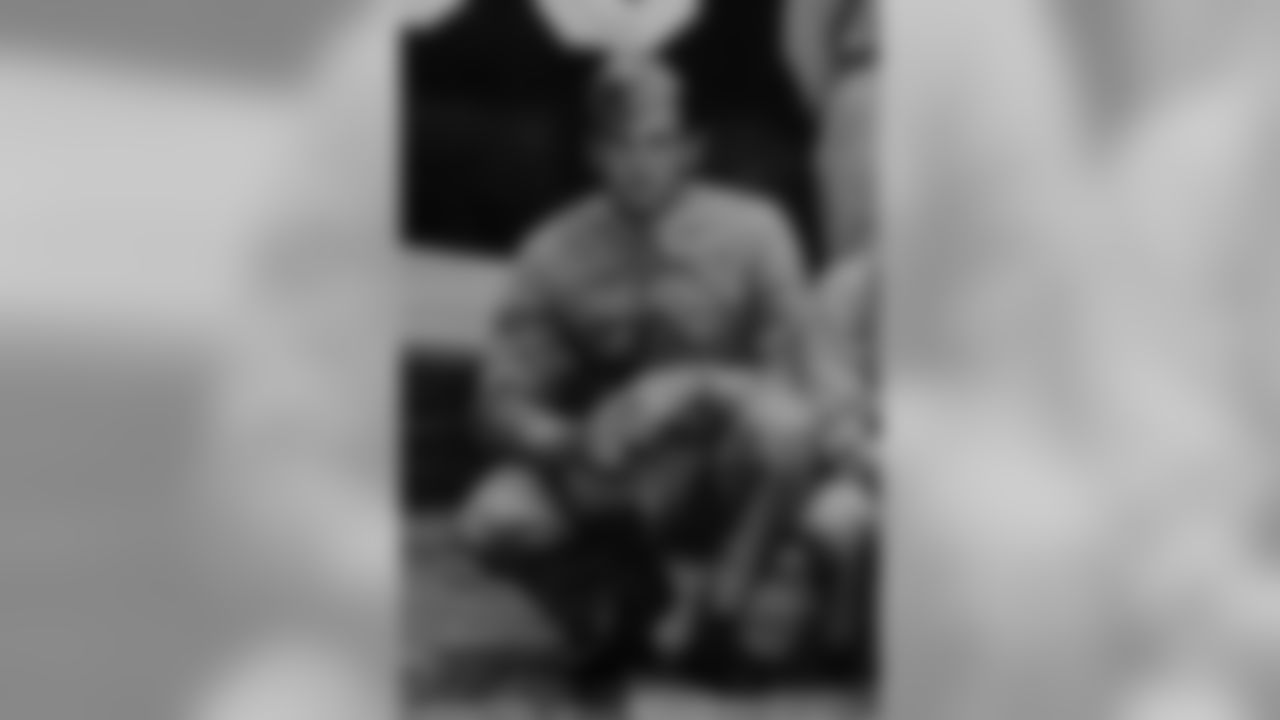
Bednarik served in the United States Army Air Forces
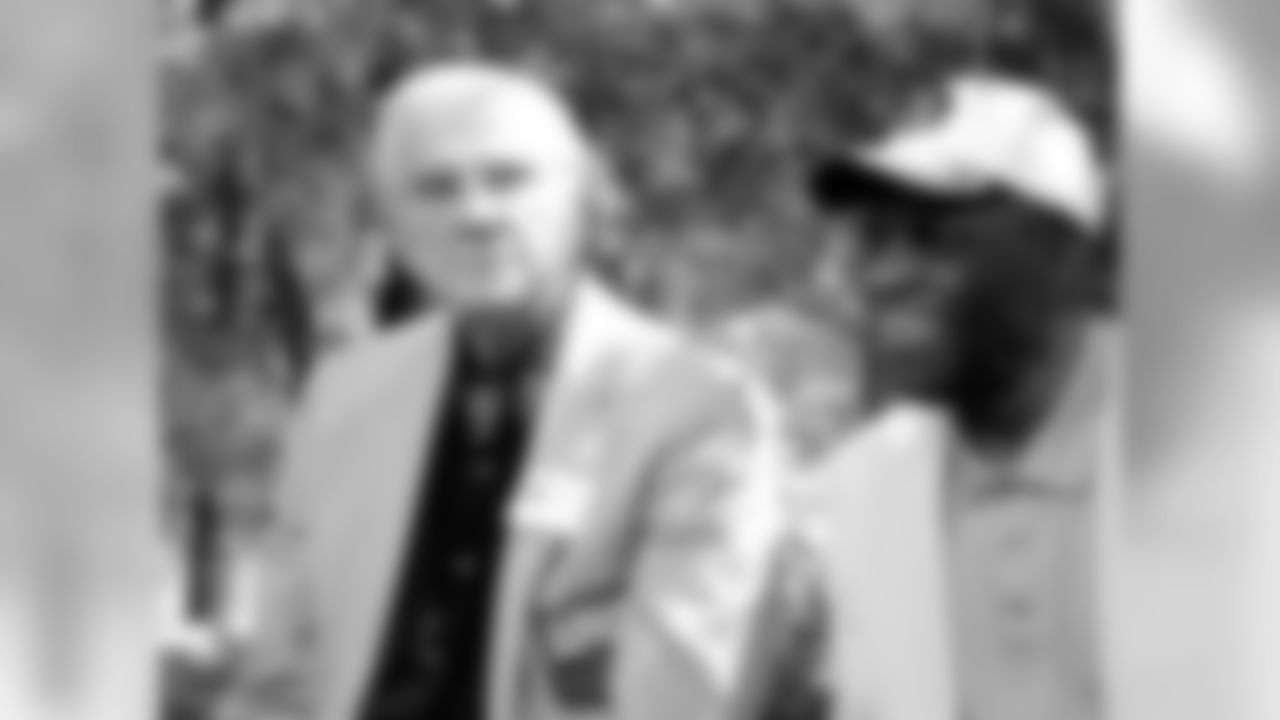
Bednarik in his Hall Of Fame jacket
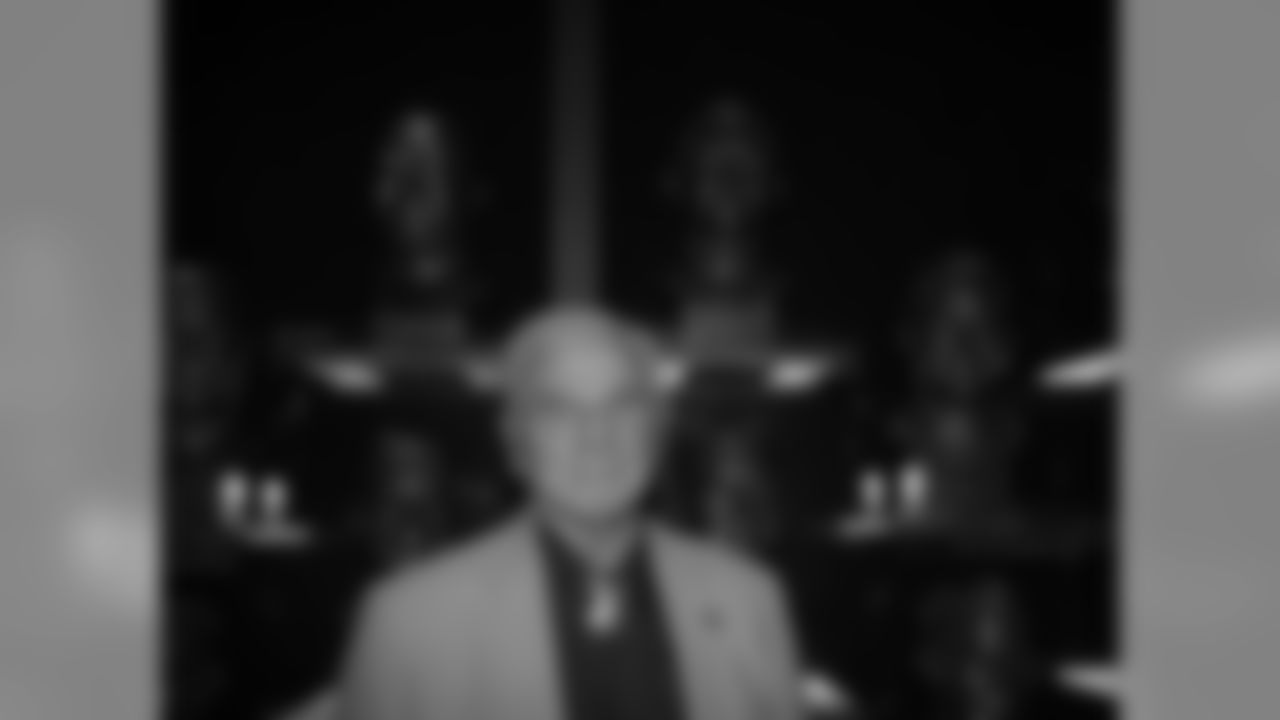
Bednarik with his Hall Of Fame bust
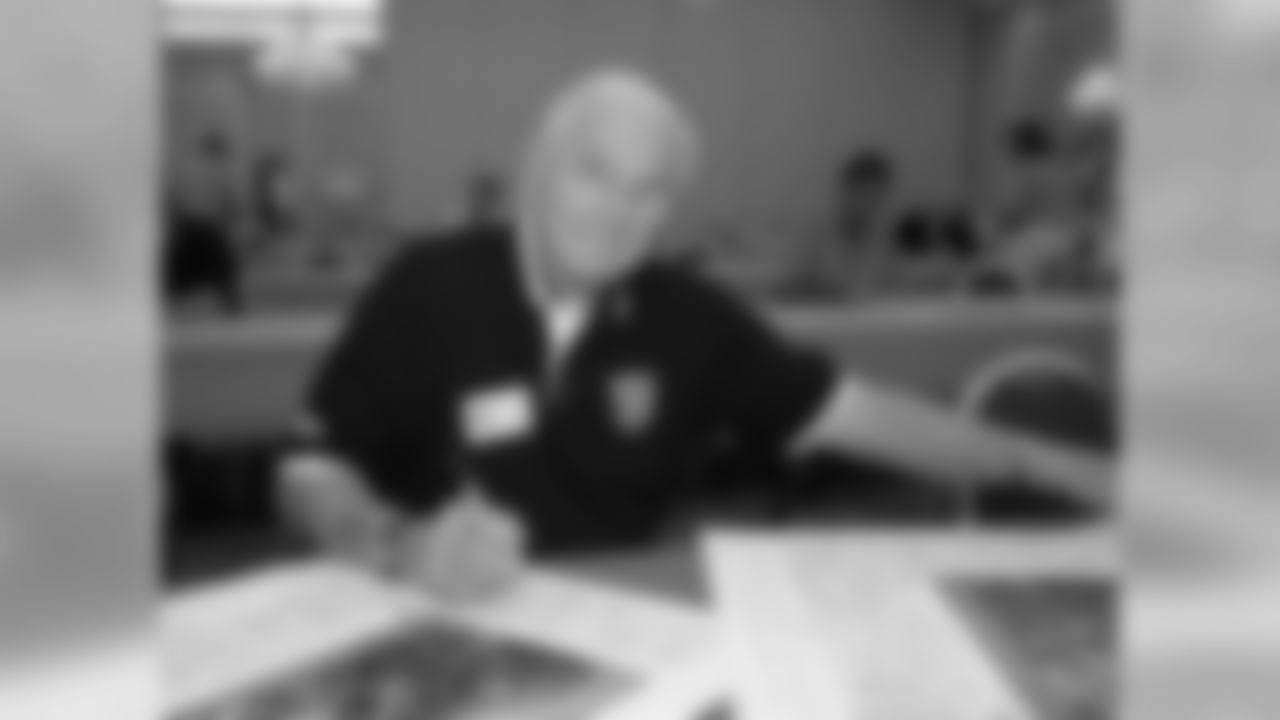
Bednarik signing some posters for the Hall Of Fame
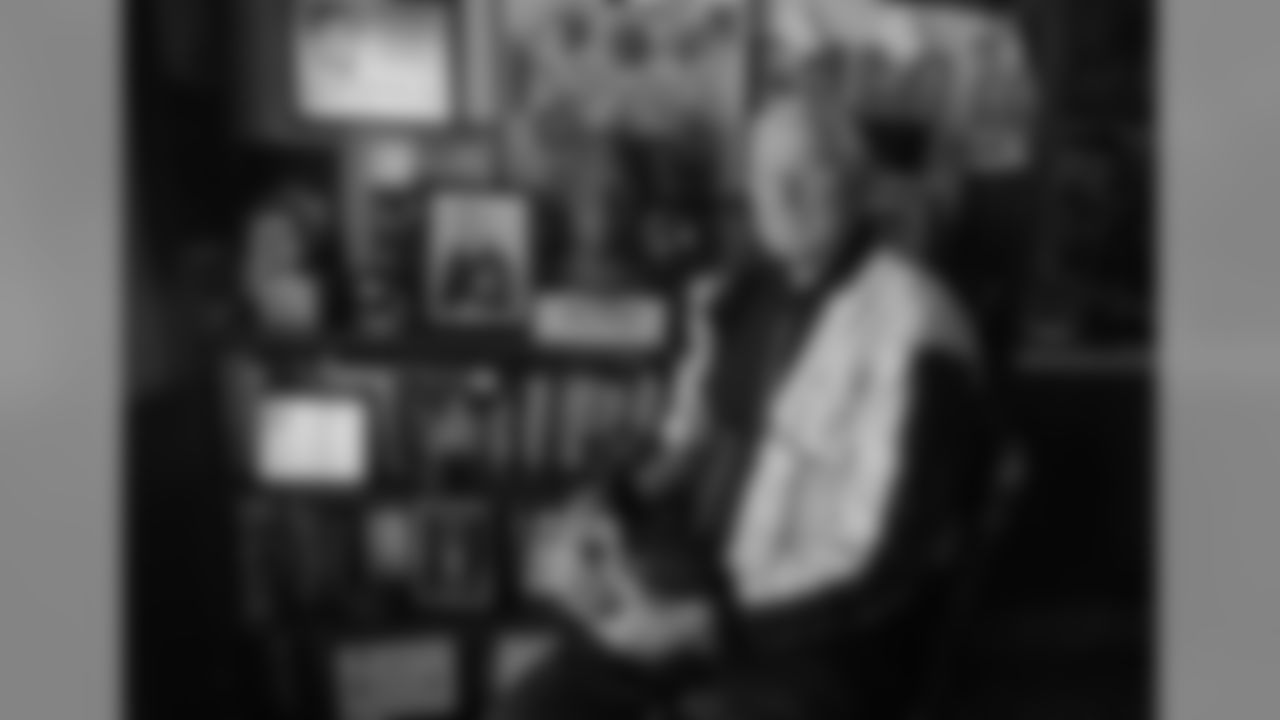
Check Bednarik passed away at the age of 89
The "Mighty Eighth" suffered 47,000 casualties including 26,000 killed. However, those missions helped turn the tide of the conflict as they crippled the German war machine and reduced cities such as Berlin, Frankfurt and Hamburg to rubble. It was the most honored of the Allied air groups with 17 fliers awarded the Medal of Honor and 220 more receiving the Distinguished Service Cross. Bednarik won the Air Medal for completing 30 combat missions, a rare feat.
"When I came back from my last one, I'll never forget it, I got off the plane and kissed the ground," Bednarik said. "I said, 'I don't ever want to fly again.' Of course, I wound up flying plenty after that but at least no one was shooting at me."
My father, Ray, was also in the Eighth Air Force. He was a navigator on a B-24 and flew many of the same missions as Bednarik, although they never met. I interviewed Bednarik many times as a newspaper reporter and a producer with NFL Films and while we talked mostly about football - yes, we talked extensively about the tackle of Frank Gifford - I was most fascinated when we talked about his experiences in the war.
For me, it was a way to understand that chapter of my father's life, something he would not share even with me. Like many veterans, he was haunted by the experience. Whenever I asked him what it was like in the war, he would say, "You don't want to know." That was the end of the conversation. Finally, I stopped asking. I read books on the air war in Europe to get some sense of what it was like, but unlike my father, Bednarik was willing to articulate it.
I recall the interview I did with Bednarik in June of 1999, at his home in Coopersburg, Pennsylvania. We talked a lot about the war that day. I saved the transcript and I've reread it many times. This is how he described what it was like to be over an enemy target in a B-24:
"You'd be over the target and all hell would be breaking loose. Flak (anti-aircraft) would be exploding all around. Shrapnel would be coming through the plane. Enemy fighters would be swooping in and I'd be firing that machine gun in every direction. It was so cold on the plane ice would form in my (oxygen) mask. Guys would be shouting, 'Fighter at nine o'clock, fighter at 10 o'clock. Look out.' It was like a nightmare.
"The worst thing was when you'd see another (bomber) get hit. Sometimes it would just explode. Other times it would break apart. You'd say, 'Come on, guys. Get outta there.' You'd hope to see parachutes. Sometimes you did, sometimes you didn't. You'd hear (the bombardier) say 'Bombs away' and you'd say, 'Let's get the hell outta here.' You'd see planes down to two engines limping along trying to make it home. Sometimes they'd crash in the (English) channel."
Bednarik described his closest call: a crash landing in England.
"We had a big hole in our wing," he said. "It was on my side so I saw it before the pilot. He said, 'Let's just hope it gets us home.' The plane shook and rattled like hell the whole way but we made it back to England. But (the pilot) didn't have much control on the way down. We hit the runway hard and blew a tire. The nose went down and we skidded about 500 yards before we finally stopped. I jumped out and ran like hell. Thank God, it didn't explode.
"After every mission we had a debriefing. They always had a bottle of whiskey on the table. We'd knock back a straight shot or two to calm our nerves. I remember that day the bottle was half empty. I said, 'This won't be enough. We need a full bottle.' The officer left the room and came back with one. He said, 'Here. You earned it.'"
Bednarik rolled up his sleeve and pointed to a tattoo on his forearm.
"It's a rose with 'Mother' written on it," Bednarik said. "It's faded now but I got it after my fourth mission. I thought that if I got shot down and they couldn't identify me - you know, with body parts all over the place - if they found this, they would know it's me. You lived with that fear every day."
After the interview, I told Bednarik about my father and how he, too, flew B-24s. He never forgot it. After that, whenever we met, after we exchanged hellos, Bednarik would ask: "How's your father?" For the men of the "Mighty Eighth," the experience they shared in the skies over Europe created a powerful bond. I finally realized that all those Sundays when my father cheered for No. 60 at Franklin Field, it was about more than football. A lot more.
An award-winning writer and producer, Ray Didinger was inducted into the Pro Football Hall of Fame in 1995. He has also won six Emmy Awards for his work as a writer and producer at NFL Films. The five-time Pennsylvania Sportswriter of the Year is a writer and analyst for Comcast SportsNet. Didinger will provide Eagles fans a unique historical perspective on the team throughout the year for PhiladelphiaEagles.com. You can read all of his Eagles History columns here. He is also the author of The New Eagles Encyclopedia. !
- VIEW: Forever An Eagle: Our Tribute To Chuck Bednarik
- READ: Didinger: Bednarik Is The Greatest All-Time Eagle
- VIDEO: Remembering A Legend: Chuck Bednarik
- VIDEO: In His Own Words: Chuck Bednarik's Journey
- READ: The Hit Still Resonates After All These Years
- VIDEO: Merrill Reese On Chuck Bednarik
- VIDEO: Highlights From The 1960 NFL Championship
- PHOTOS: An In-Depth Look At Bednarik On And Off The Gridiron























